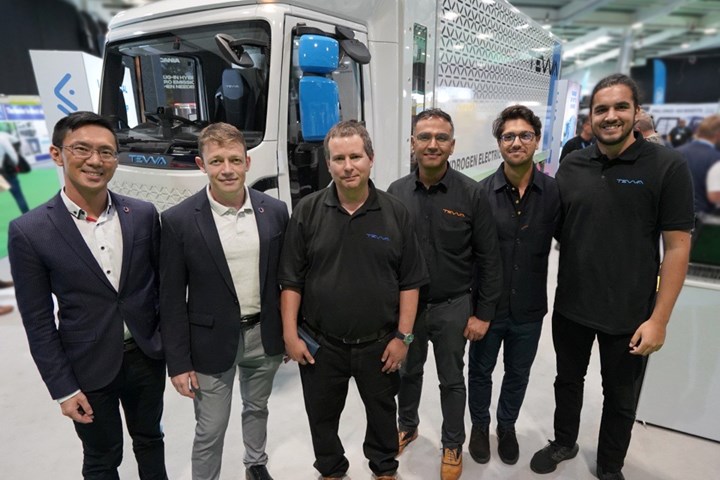Loop Energy signs $12 million supply agreement with Tevva Motors
Commitment to deliver fuel cell systems for Tevva’s hydrogen-electric trucks has been extended into 2024, gains momentum for rapid commercial deployment.
Loop Energy and Tevva Motors at the Road Transport Expo in Warwickshire, U.K. Photo Credit: Loop Energy
On July 5, Loop Energy (Vancouver, British Columbia), a developer and manufacturer of hydrogen fuel cell solutions, signed a multi-year fuel cell supply agreement with Tevva Motors Ltd. (Tevva, London, U.K.) for the delivery of Loop Energy’s fuel cell systems for Tevva’s hydrogen-electric vehicles through 2024; the hydrogen tanks used will also be fiber-reinforced. This agreement includes delivery commitments in excess of $12 million through 2023, and is said to make Tevva the first customer to move into the full production phase of Loop Energy’s Customer Adoption Cycle.
Tevva will integrate Loop Energy’s fuel cell systems into its manufacturing process as it scales production of its hydrogen-electric trucks to meet demand in 2023. The companies’ relationship continues to gain momentum after Loop Energy’s eFlow technology won the competitive tender process in 2021, which resulted in Tevva placing initial orders.
Building upon Tevva’s orders for 2022, the significant surge in order volume in 2023 increases Loop Energy’s confidence that it will meet and exceed its previous purchase order guidance. The growth in order volume indicates the commercial mobility sector’s willingness to adopt hydrogen fuel cell technology as a zero-emissions solution.
“The market for zero-emissions commercial vehicles continues to develop quickly, and this supply agreement with Tevva puts Loop Energy on the path not only [to] technology leadership, but fuel cell market leadership,” Loop Energy president and CEO, Ben Nyland, says. “This is amongst the largest fuel cell product supply agreements in recent years. The contract with Tevva is indicative of the surge in interest we see in Europe for hydrogen-electric vehicles and the fuel cells that power them.”
Tevva unveiled its first hydrogen-electric truck alongside Loop Energy at the Road Transport Expo in Warwickshire, U.K., on June 30, 2022. It is anticipated that the first of the trucks will be on the road in 2022. Once deployed, the trucks are expected to rapidly add to the 500,000 kilometers of on-road service Loop Energy’s fuel cells have already powered.
“Development of our hydrogen-electric truck platform has been encouraging, and we are seeing growing demand for our product line,” Tevva founder and CEO, Asher Bennett, concludes. ”Loop Energy continues to show it can support our production targets and provide a fuel cell solution that will deliver lower costs and improved performance to our customers. As a result, we are moving closer to our corporate goal of reducing 10 million tonnes of global transportation CO2 emissions by 2030.”
Related Content
-
Infinite Composites: Type V tanks for space, hydrogen, automotive and more
After a decade of proving its linerless, weight-saving composite tanks with NASA and more than 30 aerospace companies, this CryoSphere pioneer is scaling for growth in commercial space and sustainable transportation on Earth.
-
Recycling hydrogen tanks to produce automotive structural components
Voith Composites and partners develop recycling solutions for hydrogen storage tanks and manufacturing methods to produce automotive parts from the recycled materials.
-
Jeep all-composite roof receivers achieve steel performance at low mass
Ultrashort carbon fiber/PPA replaces steel on rooftop brackets to hold Jeep soft tops, hardtops.
















